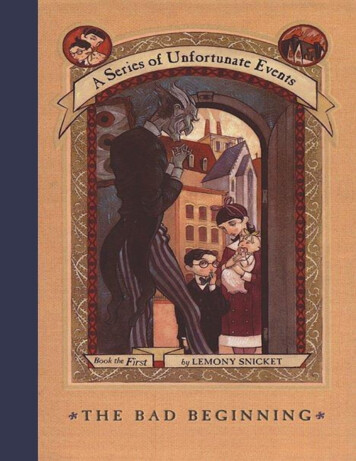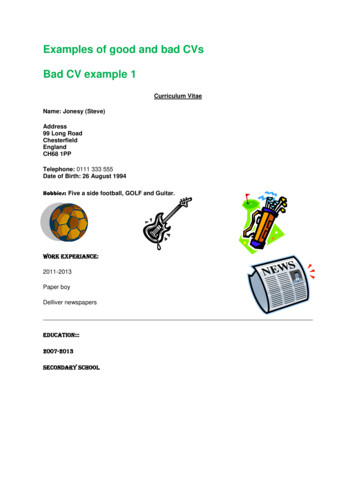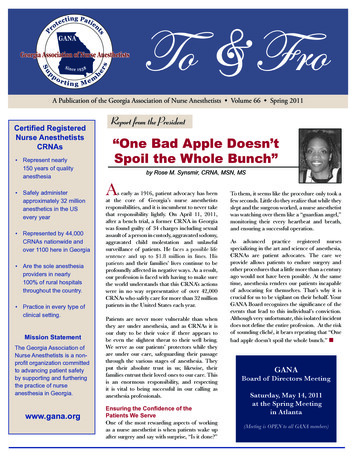
Transcription
* A Series Of Unfortunate Events *BOOK the FirstTHE BAD BEGINNINGby LEMONY SNICKETHarperCollinsPublishersTo Beatrice--darling, dearest, dead.ChapterOneIf you are interested in stories with happy endings, you would be better off reading some other book. Inthis book, not only is there no happy ending, there is no happy beginning and very few happy things in themiddle. This is because not very many happy things happened in the lives of the three Baudelaireyoungsters. Violet, Klaus, and Sunny Baudelaire were intelligent children, and they were charming, andresourceful, and had pleasant facial features, but they were extremely unlucky, and most everything thathappened to them was rife with misfortune, misery, and despair. I’m sorry to tell you this, but that is howthe story goes.Their misfortune began one day at Briny Beach. The three Baudelaire children lived with their parentsin an enormous mansion at the heart of a dirty and busy city, and occasionally their parents gave thempermission to take a rickety trolley-the word “rickety,” you probably know, here means “unsteady” or“likely to collapse”-alone to the seashore, where they would spend the day as a sort of vacation as longas they were home for dinner. This particular morning it was gray and cloudy, which didn’t bother theBaudelaire youngsters one bit. When it was hot and sunny, Briny Beach was crowded with tourists and itwas impossible to find a good place to lay one’s blanket. On gray and cloudy days, the Baudelaires hadthe beach to themselves to do what they liked.Violet Baudelaire, the eldest, liked to skip rocks. Like most fourteen-year-olds, she was right-handed,so the rocks skipped farther across the murky water when Violet used her right hand than when she usedher left. As she skipped rocks, she was looking out at the horizon and thinking about an invention shewanted to build. Anyone who knew Violet well could tell she was thinking hard, because her long hairwas tied up in a ribbon to keep it out of her eyes. Violet had a real knack for inventing and buildingstrange devices, so her brain was often filled with images of pulleys, levers, and gears, and she never
wanted to be distracted by something as trivial as her hair. This morning she was thinking about how toconstruct a device that could retrieve a rock after you had skipped it into the ocean.Klaus Baudelaire, the middle child, and the only boy, liked to examine creatures in tide-pools. Klauswas a little older than twelve and wore glasses, which made him look intelligent. He was intelligent. TheBaudelaire parents had an enormous library in their mansion, a room filled with thousands of books onnearly every subject. Being only twelve, Klaus of course had not read all of the books in the Baudelairelibrary, but he had read a great many of them and had retained a lot of the information from his readings.He knew how to tell an alligator from a crocodile. He knew who killed Julius Caesar. And he knew muchabout the tiny, slimy animals found at Briny Beach, which he was examining now.Sunny Baudelaire, the youngest, liked to bite things. She was an infant, and very small for her age,scarcely larger than a boot. What she lacked in size, however, she made up for with the size andsharpness of her four teeth. Sunny was at an age where one mostly speaks in a series of unintelligibleshrieks. Except when she used the few actual words in her vocabulary, like “bottle,” “mommy,” and“bite,” most people had trouble understanding what it was that Sunny was saying. For instance, thismorning she was saying “Gack!” over and over, which probably meant, “Look at that mysterious figureemerging from the fog!”Sure enough, in the distance along the misty shore of Briny Beach there could be seen a tall figurestriding toward the Baudelaire children. Sunny had already been staring and shrieking at the figure forsome time when Klaus looked up from the spiny crab he was examining, and saw it too. He reached overand touched Violet’s arm, bringing her out of her inventing thoughts.“Look at that,” Klaus said, and pointed toward the figure. It was drawing closer, and the children couldsee a few details. It was about the size of an adult, except its head was tall, and rather square.“What do you think it is?” Violet asked.“I don’t know,” Klaus said, squinting at it, “but it seems to be moving right toward us.”“We’re alone on the beach,” Violet said, a little nervously. “There’s nobody else it could be movingtoward.” She felt the slender, smooth stone in her left hand, which she had been about to try to skip as faras she could. She had a sudden thought to throw it at the figure, because it seemed so frightening.“It only seems scary,” Klaus said, as if reading his sister’s thoughts, “because of all the mist.”This was true. As the figure reached them, the children saw with relief that it was not anybodyfrightening at all, but somebody they knew: Mr. Poe. Mr. Poe was a friend of Mr. and Mrs. Baudelaire’swhom the children had met many times at dinner parties. One of the things Violet, Klaus, and Sunny reallyliked about their parents was that they didn’t send their children away when they had company over, butallowed them to join the adults at the dinner table and participate in the conversation as long as theyhelped clear the table. The children remembered Mr. Poe because he always had a cold and wasconstantly excusing himself from the table to have a fit of coughing in the next room.Mr. Poe took off his top hat, which had made his head look large and square in the fog, and stood for amoment, coughing loudly into a white handkerchief. Violet and Klaus moved forward to shake his handand say how do you do.“How do you do?” said Violet.“How do you do?” said Klaus.“Odo yow!” said Sunny.
“Fine, thank you,” said Mr. Poe, but he looked very sad. For a few seconds nobody said anything, andthe children wondered what Mr. Poe was doing there at Briny Beach, when he should have been at thebank in the city, where he worked. He was not dressed for the beach.“It’s a nice day,” Violet said finally, making conversation. Sunny made a noise that sounded like anangry bird, and Klaus picked her up and held her.“Yes, it is a nice day,” Mr. Poe said absently, staring out at the empty beach. “I’m afraid I have somevery bad news for you children.”The three Baudelaire siblings looked at him. Violet, with some embarrassment, felt the stone in her lefthand and was glad she had not thrown it at Mr. Poe.“Your parents,” Mr. Poe said, “have perished in a terrible fire.”The children didn’t say anything.“They perished,” Mr. Poe said, “in a fire that destroyed the entire house. I’m very, very sorry to tellyou this, my dears.”Violet took her eyes off Mr. Poe and stared out at the ocean. Mr. Poe had never called the Baudelairechildren “my dears” before. She understood the words he was saying but thought he must be joking,playing a terrible joke on her and her brother and sister.“ ‘Perished,’ ” Mr. Poe said, “means ‘killed.’ ”“We know what the word ‘perished’ means,” Klaus said, crossly. He did know what the word“perished” meant, but he was still having trouble understanding exactly what it was that Mr. Poe had said.It seemed to him that Mr. Poe must somehow have misspoken.“The fire department arrived, of course,” Mr. Poe said, “but they were too late. The entire house wasengulfed in fire. It burned to the ground.”Klaus pictured all the books in the library, going up in flames. Now he’d never read all of them.Mr. Poe coughed several times into his handkerchief before continuing. “I was sent to retrieve youhere, and to take you to my home, where you’ll stay for some time while we figure things out. I am theexecutor of your parents’ estate. That means I will be handling their enormous fortune and figuring outwhere you children will go. When Violet comes of age, the fortune will be yours, but the bank will takecharge of it until you are old enough.”Although he said he was the executor, Violet felt like Mr. Poe was the executioner. He had simplywalked down the beach to them and changed their lives forever.“Come with me,” Mr. Poe said, and held out his hand. In order to take it, Violet had to drop the stoneshe was holding. Klaus took Violet’s other hand, and Sunny took Klaus’s other hand, and in that mannerthe three Baudelaire children-the Baudelaire orphans, now-were led away from the beach and from theirprevious lives.ChapterTwo
It is useless for me to describe to you how terrible Violet, Klaus, and even Sunny felt in the time thatfollowed. If you have ever lost someone very important to you, then you already know how it feels, and ifyou haven’t, you cannot possibly imagine it. For the Baudelaire children, it was of course especiallyterrible because they had lost both their parents at the same time, and for several days they felt somiserable they could scarcely get out of bed. Klaus found he had little interest in books. The gears inViolet’s inventive brain seemed to stop. And even Sunny, who of course was too young to reallyunderstand what was going on, bit things with less enthusiasm.Of course, it didn’t make things any easier that they had lost their home as well, and all theirpossessions. As I’m sure you know, to be in one’s own room, in one’s own bed, can often make a bleaksituation a little better, but the beds of the Baudelaire orphans had been reduced to charred rubble. Mr.Poe had taken them to the remains of the Baudelaire mansion to see if anything had been unharmed, and itwas terrible: Violet’s microscope had fused together in the heat of the fire, Klaus’s favorite pen hadturned to ash, and all of Sunny’s teething rings had melted. Here and there, the children could see traces ofthe enormous home they had loved: fragments of their grand piano, an elegant bottle in which Mr.Baudelaire kept brandy, the scorched cushion of the windowseat where their mother liked to sit and read.Their home destroyed, the Baudelaires had to recuperate from their terrible loss in the Poe household,which was not at all agreeable. Mr. Poe was scarcely at home, because he was very busy attending to theBaudelaire affairs, and when he was home he was often coughing so much he could barely have aconversation. Mrs. Poe purchased clothing for the orphans that was in grotesque colors, and itched. Andthe two Poe children-Edgar and Albert-were loud and obnoxious boys with whom the Baudelaires had toshare a tiny room that smelled of some sort of ghastly flower.But even given the surroundings, the children had mixed feelings when, over a dull dinner of boiledchicken, boiled potatoes and blanched-the word “blanched” here means “boiled”-string beans, Mr. Poeannounced that they were to leave his household the next morning.“Good,” said Albert, who had a piece of potato stuck between his teeth. “Now we can get our roomback. I’m tired of sharing it. Violet and Klaus are always moping around, and are never any fun.”“And the baby bites,” Edgar said, tossing a chicken bone to the floor as if he were an animal in a zooand not the son of a well-respected member of the banking community.“Where will we go?” Violet asked nervously.Mr. Poe opened his mouth to say something, but erupted into a brief fit of coughing. “I have madearrangements,” he said finally, “for you to be raised by a distant relative of yours who lives on the otherside of town. His name is Count Olaf.”Violet, Klaus, and Sunny looked at one another, unsure of what to think. On one hand, they didn’t wantto live with the Poes any longer. On the other hand, they had never heard of Count Olaf and didn’t knowwhat he would be like.“Your parents’ will,” Mr. Poe said, “instructs that you be raised in the most convenient way possible.Here in the city, you’ll be used to your surroundings, and this Count Olaf is the only relative who liveswithin the urban limits.”Klaus thought this over for a minute as he swallowed a chewy bit of bean. “But our parents nevermentioned Count Olaf to us. Just how is he related to us, exactly?”Mr. Poe sighed and looked down at Sunny, who was biting a fork and listening closely. “He is either athird cousin four times removed, or a fourth cousin three times removed. He is not your closest relative on
the family tree, but he is the closest geographically. That’s why-”“If he lives in the city,” Violet said, “why didn’t our parents ever invite him over?”“Possibly because he was very busy,” Mr. Poe said. “He’s an actor by trade, and often travels aroundthe world with various theater companies.”“I thought he was a count,” Klaus said.“He is both a count and an actor,” Mr. Poe said. “Now, I don’t mean to cut short our dinner, but youchildren have to pack up your things, and I have to return to the bank to do some more work. Like yournew legal guardian, I am very busy myself.”The three Baudelaire children had many more questions for Mr. Poe, but he had already stood up fromthe table, and with a slight wave of his hand departed from the room. They heard him coughing into hishandkerchief and then the front door creaked shut as he left the house.“Well,” Mrs. Poe said, “you three had better start packing. Edgar, Albert, please help me clear thetable.”The Baudelaire orphans went to the bedroom and glumly packed their few belongings. Klaus lookeddistastefully at each ugly shirt Mrs. Poe had bought for him as he folded them and put them into a smallsuitcase. Violet looked around the cramped, smelly room in which they had been living. And Sunnycrawled around solemnly biting each of Edgar and Albert’s shoes, leaving small teeth marks in each oneso she would not be forgotten. From time to time, the Baudelaire children looked at one another, but withtheir future such a mystery they could think of nothing to say. At bedtime, they tossed and turned all night,scarcely getting any sleep between the loud snoring of Edgar and Albert and their own worried thoughts.Finally, Mr. Poe knocked on the door and stuck his head into the bedroom.“Rise and shine, Baudelaire
The three Baudelaire siblings looked at him. Violet, with some embarrassment, felt the stone in her left hand and was glad she had not thrown it at Mr. Poe. “Your parents,” Mr. Poe said, “have perished in a terrible fire.” The children didn’t say anything. “They perished,”











